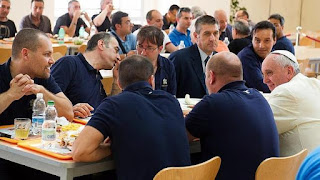St.
Therese of Child Jesus (of Lisieux)
How she became a saint?
1. I desired…
“I have always desired to become a saint”
“It is our Father alone who can make us saints”
“I realized that our Lord does not call those who are worthy but those whom He will”.
“In our relationship with God we are very small children. We always will be. There is no need to be anything else”.
“From my childhood, I have had the conviction that I should one day be released from this land of darkness, that I should one day enter your kingdom of light”.
“God answered my prayer, since that day love has surrounded and penetrated me. God’s merciful love renews and purifies me”
2. I took little way
“We live in an age of inventions; there are now lifts which save us the trouble of climbing stairs. I will try to find a lift by which I may be raised unto God”.
“I will seek out a means of reaching heaven by a little way – very short, very straight and entirely new”.
3. Remained little before God
“To search our Father in Heaven we must remain little”.
“Speak simply and our Father never fails to understand”.
“To stay little, we must recognize our own insignificance and expect everything from the goodness of God”.
“We must stay little in order to make quick progress along the path of divine love”.
“Our Father’s mercy is our strength”.
“Our Father does not inspire us to do what cannot be done”
“Our Father asks only our good will”
“Our Father gives himself as generously to the least of His children as to the greatest”.
“When I found the words of wisdom… “whosoever is a little one let him come to me”, they gave me the confidence to draw near to God.
4. Surrendered to our Father
“The Way to our Father is the way of Confidence and love”.
“Our father calls us to love”
“Hope in our Father will not be vain”.
“It is surrender to the Father that leads to love”.
“I understand clearly that it is through love alone that we can become pleasing to God and my sole ambition is to acquire it”.
“Love for our Father does not walk a path carpeted in flowers”.
5. Understood my vocation as !Love!
“I have found my vocation at last – !my vocation is love!
“When we love one another, our Father is acting within us”.
“Do good, hoping for nothing thereby and your reward shall be great”.
“Love alone can expand our heart”.
“Love will drive fear from my heart”.
“Our Father sees only in the love with which we act”.
“Our Father in his love will ask of us great things”.
“I love St. Augustine and St. Mary Magdalene, those souls to whom much was forgiven because they loved much”.
“I understand now that true charity consists in bearing all my neighbor’s defects, in not being surprised by their mistakes, but being edified by their smallest virtues”.


































